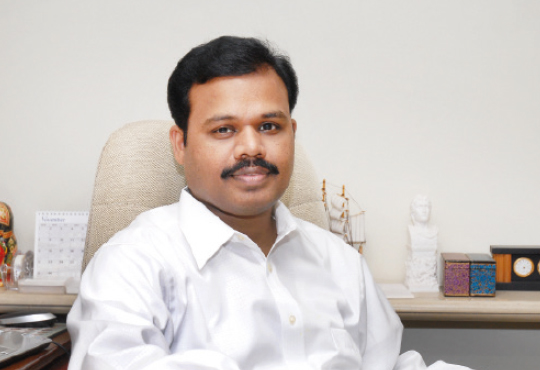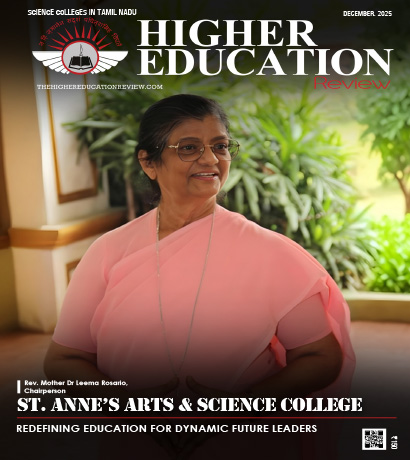Indian Education System: What is lacking?

Dr. P Sathyanarayanan , President SRM University
Dr. P Sathyanarayanan obtained his Bachelors in Engineering from Anna University and Master of Science from Northeastern University in the USA and his Doctoral degree from Southern Cross University, Sydney. Holding the chair of President at SRM University and being a young and dynamic entrepreneur, he lives by his motto "Think big, do big, achieve big". On an interaction with Higher Education Review magazine, Sathyanarayanan talks about the current scenarios in the education sector and the approaches that should be adopted by educational institutions.
Q. The need of the hour is to have leaders who can dream big and raise the aspirations of people. What is the importance of a quality education in this process? Do you believe that the present education system in India is capable of doing it?
I have been mulling over the real role of an educator for a while now. The 21st century has witnessed tremendous growth in terms of innovation, science, art and human lives. Not a single domain has stayed untouched. From Hyperloop to Bitcoin, to flying cars or Architectural Robots, the world has seen magic happen. Amidst it all, really, what is the role of a good educator? I would say, a good educator is a facilitator today. A good education is possible only when the educator acts like a facilitator, an enabler who is willing to encourage creativity and spirit of innovation within students.
Q. Do you believe that our current education structure allows fresher graduates to be job-ready as they step out of universities? If not, then how can we abate this?
Job-ready, what it is exactly? I believe amidst all the cut-throat competition of the age, we have forgotten the essence of true education. The importance of knowledge coupled with the capability of healthy imagination is taking back bench amidst all humdingers of "good job" and "big success." A recent headline in Hindu Business Line reads - "95 percent engineers in India unfit for software development jobs." Why won't they be if theories are not being backed by applications or practice? In the urge to achieve high CGPAs, students are learning textbook theories and taking papers- without any understanding of how to apply the knowledge in real life situations. The solution is curriculum with equal emphasis on practice. Experiential learning opportunities backed by a spirit of research within universities can prepare globe and job ready India professionals.
Q. In your opinion, apart from covering the usual syllabus, what should be the focus of any institution to place their students in a good position?
I think it is imperative now for educational institutes to foster a fitting ecosystem for students to study things beyond their prescribed syllabus. A multi-disciplinary approach to education should be practiced allowing students with room to think and delve into subject areas of their interest. It is important for an engineer to appreciate art and equally important for an artist to understand the science behind aesthetics and art. Unless students are encouraged to be "free-thinkers", the journey to greater discoveries shall stay incomplete.
Q. Do you believe that fresher graduates should run for the big names in the industry? What is your advice on the same?
In my opinion, working in a smaller set-up or beginning with a corporate- both got its sets of pros and cons. While a Fortune 500 is a great launch pad for a fresher, you wouldn't get to learn as much as a start-up ecosystem will teach you. Smaller companies have certain limitations and challenges which actually forge great leaders out of individuals. A blue chip company enables you to network better. While working at a start-up is about being flexible with your job roles, being open to ideas and experimentations, bigger organizations mostly have strict regimes that got to be followed. Therefore, my suggestion is- look at the job role. See if it excites you. Have a vision. Pick up a job that helps you to make meaningfully contribute to the society and world at large. Unless you derive joy from what you do, you would not really like it ten years from now.
Q. With various technological innovations, the learning pattern has been changing drastically over the years. Considering this, do you think distance learning is a good choice for students today? How would you rate it against a regular course?
With major breakthroughs in technologies, the learning pattern has drastically changed over time. EdX and cloud learning avenues have changed the ball game of classroom learning, forever. However, nothing can ever replace the role of a teacher or a guru. There is no alternative to classroom brainstorming sessions between faculty and peers.
Q. As you have been in the higher education sector for a long time, what are the predictable changes in the higher education sector that you are expecting in the near future?
Artificial Intelligence (AI) is going to be the next game-changing industry and educational institutes must prepare students to champion AI eventually.
Q. The need of the hour is to have leaders who can dream big and raise the aspirations of people. What is the importance of a quality education in this process? Do you believe that the present education system in India is capable of doing it?
I have been mulling over the real role of an educator for a while now. The 21st century has witnessed tremendous growth in terms of innovation, science, art and human lives. Not a single domain has stayed untouched. From Hyperloop to Bitcoin, to flying cars or Architectural Robots, the world has seen magic happen. Amidst it all, really, what is the role of a good educator? I would say, a good educator is a facilitator today. A good education is possible only when the educator acts like a facilitator, an enabler who is willing to encourage creativity and spirit of innovation within students.
Q. Do you believe that our current education structure allows fresher graduates to be job-ready as they step out of universities? If not, then how can we abate this?
Job-ready, what it is exactly? I believe amidst all the cut-throat competition of the age, we have forgotten the essence of true education. The importance of knowledge coupled with the capability of healthy imagination is taking back bench amidst all humdingers of "good job" and "big success." A recent headline in Hindu Business Line reads - "95 percent engineers in India unfit for software development jobs." Why won't they be if theories are not being backed by applications or practice? In the urge to achieve high CGPAs, students are learning textbook theories and taking papers- without any understanding of how to apply the knowledge in real life situations. The solution is curriculum with equal emphasis on practice. Experiential learning opportunities backed by a spirit of research within universities can prepare globe and job ready India professionals.
Q. In your opinion, apart from covering the usual syllabus, what should be the focus of any institution to place their students in a good position?
I think it is imperative now for educational institutes to foster a fitting ecosystem for students to study things beyond their prescribed syllabus. A multi-disciplinary approach to education should be practiced allowing students with room to think and delve into subject areas of their interest. It is important for an engineer to appreciate art and equally important for an artist to understand the science behind aesthetics and art. Unless students are encouraged to be "free-thinkers", the journey to greater discoveries shall stay incomplete.
Q. Do you believe that fresher graduates should run for the big names in the industry? What is your advice on the same?
In my opinion, working in a smaller set-up or beginning with a corporate- both got its sets of pros and cons. While a Fortune 500 is a great launch pad for a fresher, you wouldn't get to learn as much as a start-up ecosystem will teach you. Smaller companies have certain limitations and challenges which actually forge great leaders out of individuals. A blue chip company enables you to network better. While working at a start-up is about being flexible with your job roles, being open to ideas and experimentations, bigger organizations mostly have strict regimes that got to be followed. Therefore, my suggestion is- look at the job role. See if it excites you. Have a vision. Pick up a job that helps you to make meaningfully contribute to the society and world at large. Unless you derive joy from what you do, you would not really like it ten years from now.
Q. With various technological innovations, the learning pattern has been changing drastically over the years. Considering this, do you think distance learning is a good choice for students today? How would you rate it against a regular course?
With major breakthroughs in technologies, the learning pattern has drastically changed over time. EdX and cloud learning avenues have changed the ball game of classroom learning, forever. However, nothing can ever replace the role of a teacher or a guru. There is no alternative to classroom brainstorming sessions between faculty and peers.
Q. As you have been in the higher education sector for a long time, what are the predictable changes in the higher education sector that you are expecting in the near future?
Artificial Intelligence (AI) is going to be the next game-changing industry and educational institutes must prepare students to champion AI eventually.

